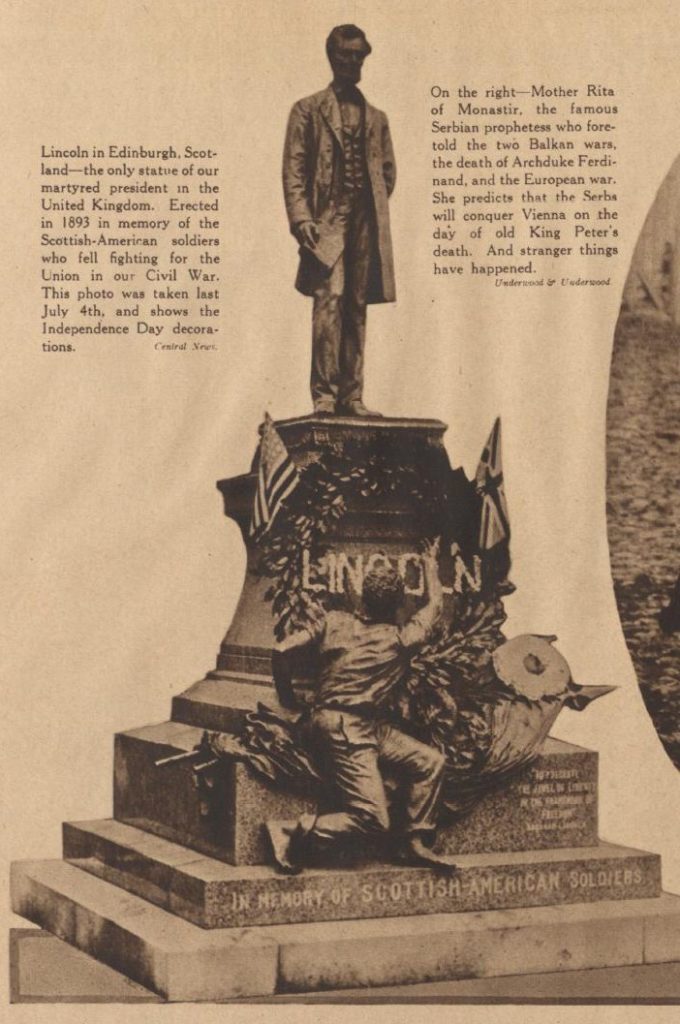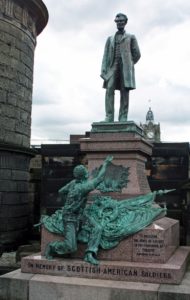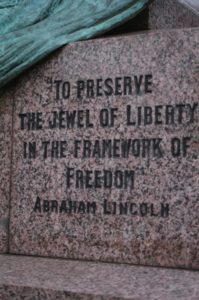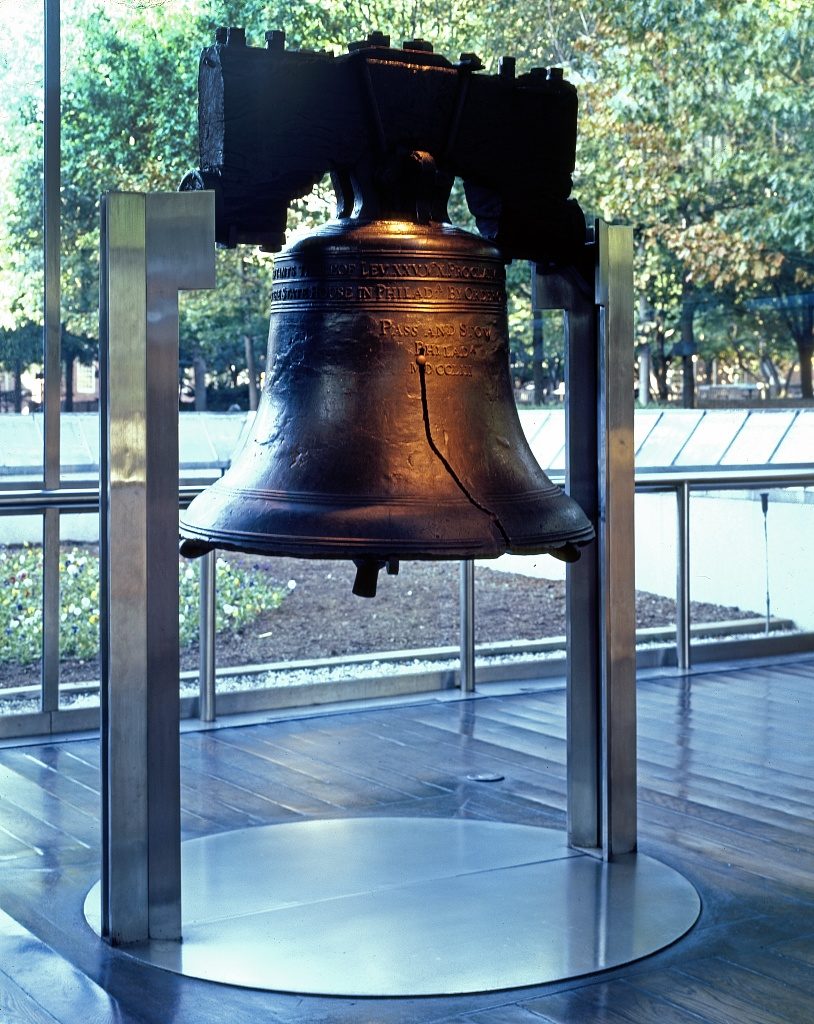Glancing through some picture paper previews last week, I noticed an image that appeared to be a statue of Abraham Lincoln. Upon further review (and enlargement) my guess proved accurate. From the August 12, 1917 issue of the New York Tribune:
Caroline Hurley’s article in the American Studies Journal points out that the Edinburgh statue emphasizes President Lincoln’s role as the Great Emancipator and that after the Emancipation Proclamation “the American Consul in Glasgow found his office inundated with applications from local men who wished to join the Union army”. The author also explains the words on the monument’s front:
… The phrase engraved onto the front of the base is a quote from an 1864 letter from Lincoln to Governor Michael Hahn of Louisiana, in which he expresses his wish that extension of the franchise be made to a portion of the black male population.
It reads, “To preserve the jewel of Liberty in the framework of Freedom.” Again, rather than using a famous quote referring directly to the war, Bruce [American consul in Edinburgh responsible for the statue idea and its implemantation] and Bissell [the sculptor] have used a statement that underlines the memorial’s celebration of suffrage.[1]
Upon further review there appears to be evidence that the quote is possibly somewhat misquoted, at least in terms of the original letter as composed by Abraham Lincoln. An article in the June 23, 1865 issue of From The New-York Times includes Abraham Lincoln’s note to Louisiana Governor Michael Hahn:
THE LATE PRESIDENT LINCOLN ON NEGRO SUFFRAGE.; A Letter from Him to Gov. Hahn of Louisiana.
From the Washington Chronicle.
The following correspondence needs no comments. Hon. Wm. D. KELLEY, the able representative in Congress from the Fourth (Pennsylvania) District, known for his earnest advocacy of colored suffrage, writes to Hon. MICHAEL HAHN, Senator elect from Louisiana, calling forth a letter from the lamented President LINCOLN, which bears directly on that important subject, and will be found to be of valuable interest:
WASHINGTON, Tuesday, June 20, 1865.
Hon. Michael Hahn:
DEAR SIR: Our late President did me the honor to show me a “private” note of congratulation which he addressed to you on your election to the office of Governor of Louisiana, in which he urged you to use your influence in promoting the extension of the right of suffrage to American citizens of African descent, He subsequently made it quite public by showing it to others in my presence, and intimated to me that he had authorized its publication. As he has been withdrawn from our midst, and many good people are anxious to know what opinions he held on the subject, may I not with propriety request a copy of that letter for publication? Hoping that you will, under the circumstances, feel free to furnish a copy for this purpose, I remain, very truly, yours.
WM.D. KELLEY.
WASHINGTON, Wednesday, June 21, 1865.
Hon. W.D. Kelley:
DEAR JUDGE: In compliance with your wishes, as expressed in your note of yesterday, I inclose you a copy of the only letter I ever received from President LINCOLN, bearing directly on the subject of negro suffrage. The letter, although marked “private,” was no doubt intended to be seen by other Union men in Louisiana beside myself, and was consequently shown to many members of our Constitutional Convention and leading free-State men.
Some months ago, pressed by many good citizens of Louisville to give publicity to Mr. LINCOLN’s opinion on this important question, I incidentally mentioned the request in a letter to Mr. LINCOLN, with the view of knowing whether the publication would be agreeable him. On this subject I received no answer. However, in a communication on colored suffrage, written some months ago by Senator GRATZ BROWN, of Missouri, and extensively published, direct reference is made to this letter, and an accurate quotation is made therefrom as furnished by Mr. LINCOLN. The copy which Mr. LINCOLN preserved was also read by him to a number of other gentlemen. In writing to a citizen of Louisiana recently, you used these words: “that letter belongs to history.” Under all the circumstances, I can see no impropriety in furnishing you with a copy.
The letter, written in the mild and graceful tone which imparted so much weight to Mr. LINCOLN’s simple suggestions, no doubt had great effect on the action of the Louisiana Convention in all matters appertaining to the colored man. The Convention, besides decreeing instantaneous, uncompensated emancipation, constitutionally provided for the education of all children, without distinction of color; for the enrollment of all men, white and black, in the militia; and invested the Legislature with power to extend to the colored man the highest privilege of citizenship.
Your friend, MICHAEL HAHN.
MR. LINCOLN’S LETTER.
EXECUTIVE MANSION, WASHINGTON, March 13, 1864.
Hon. Michael Hahn:
MY DEAR SIR: I congratulate you on having fixed your name in history as the first free-State Governor of Louisiana. Now you are about to have a convention, which, among other things, will probably define the elective franchise. I barely suggest, for your private consideration, whether some of the colored people may not be let in, as, for instance, the very intelligent, and especially those who have fought gallantly in our ranks. They would probably help, in some trying time to come, to keep the jewel of liberty in the family of freedom. But this is only a suggestion, not to the public, but to you alone.
Truly yours, A. LINCOLN.
You can actually see President Lincoln’s March 13, 1864 letter to Governor Hahn at the Library of Congress; it looks like “family of freedom”.
Civil War monuments are controversial in 2017. Currently many Confederate statues and monuments are being removed across the United States, and the public debates whether or not that should happen. In an article from Business Insider Daniel Brown has recently reported that after the war Robert E. Lee himself was opposed to Confederate monuments and the use of the rebel flag.
I doubt that the Lincoln monument is going to be dismantled any time soon, although nowadays people might be outraged that an American president encouraged suffrage only for black soldiers and “the very intelligent” black men. Mr. Lincoln was undoubtedly personally opposed to slavery, but at times he claimed that emancipation was secondary to his top priority of keeping the Union in one piece.
In a famous August 22, 1862 letter to Horace Greeley President Lincoln wrote: “… My paramount object in this struggle is to save the Union, and is not either to save or to destroy slavery. If I could save the Union without freeing any slave I would do it, and if I could save it by freeing all the slaves I would do it; and if I could save it by freeing some and leaving others alone I would also do that. What I do about slavery, and the colored race, I do because I believe it helps to save the Union …”
One of Mr. Lincoln’s statements that is most memorable to me was written in an April 4, 1864 letter to Albert G. Hodges, which begins, “I am naturally anti-slavery. If slavery is not wrong, nothing is wrong. I can not remember when I did not so think, and feel.” The rest of the letter maintained that the president’s main objective was to save the Union. He used the emancipation proclamation after the border states refused his compensated emancipation plan in 1862. He seemed to mostly justify the proclamation by the addition of 130,000 (black) “soldiers, seamen, and laborers”.
You can read more about the Edinburgh monument at the American Civil War Round Table UK
Both modern (color) images of the Edinburgh statue are by Caroline Hurley. Her work is licensed by Creative Commons. The Library of Congress provides Carol M. Highsmith’s photo of the Liberty Bell
- [1]Hurley, Caroline. “Lincoln in Scotland: A Gift of the Gilded Age.” American Studies Journal 60 (2016). Web. 21 August 2017. DOI 10.18422/60-05.↩




